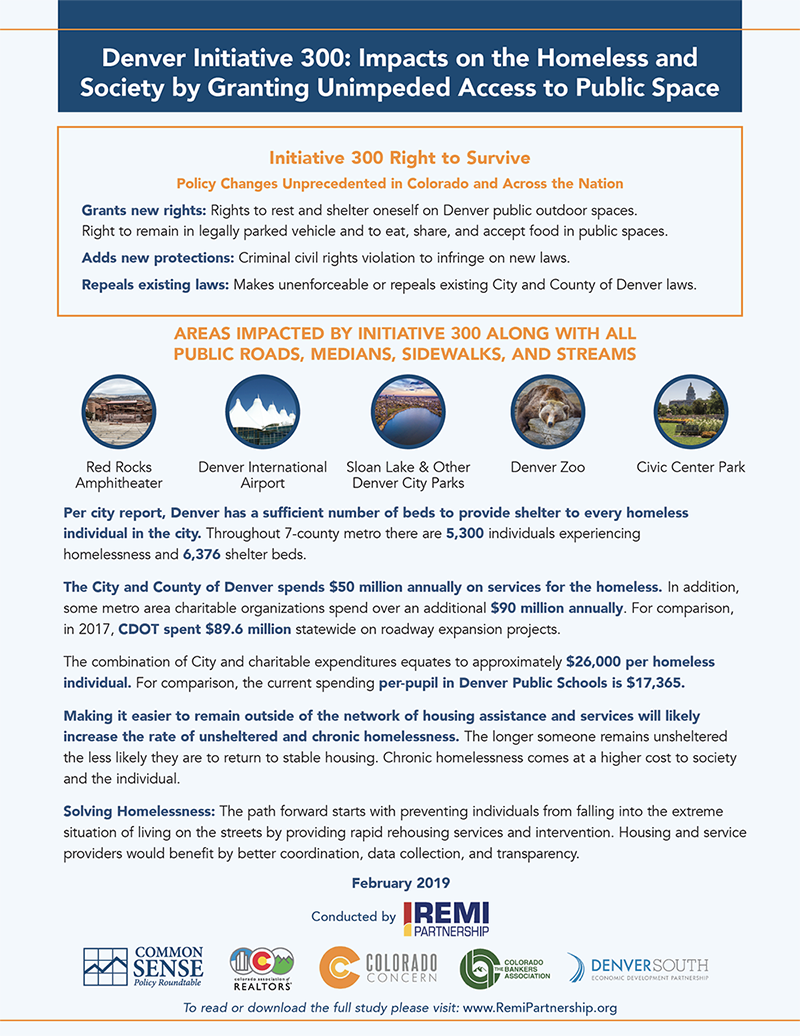Initiative 300 is a broad measure whereby supporters have asserted unimpeded use of public space for the purpose of erecting non-obstructive shelter, indefinitely, is a right to be extended to everybody including those experiencing homelessness. No city in the US has passed similar allowances. However, courts have ruled that cities cannot enforce certain laws that restrict access to public space if there is nowhere for individuals to go. Some of those cities experienced significant economic loss (downturn in tourism) and increased taxpayer costs resulting from growing public scrutiny to address the problem of large populations of unsheltered individuals. The reasons for the court-mandated unimpeded access to public spaces in the case study cities do not exist in Denver. There are a sufficient number of beds/shelters available and those experiencing homelessness are not being criminalized for violating the “urban camping ban.”
Data on successful exits from homelessness are clear; the longer people are unsheltered, the more challenging rehousing. Strategies to improve rapid rehousing, early intervention and supportive housing are the path forward as they mitigate the risks to the individual and society of long-term homelessness.
- The City and County of Denver spends $50 million annually on services for the homeless.
- In addition to expenditures by the City, just the few organizations who’s budgets could be determined, metro area charitable organizations spend over an additional $90 million annually. For comparison, in 2017, CDOT spent $89.6 million statewide on roadway expansion projects.
- The combination of City and charitable expenditures equates to approximately $26,000 per homeless individual. For comparison the current spending per-pupil in Denver Public Schools is $17,365.
- Snapshot of the population of people experiencing homelessness in the region from 2018 point-in-time survey.
- In the Denver Metro area, there are approximately 5,300 people experiencing homelessness.
- According to the 2018 point-in-time survey, there were 3,445 individuals experiencing homelessness in the city of Denver. That represents approximately 65% of the region total of 5,317 individuals throughout the 7-county metro area coving Adams, Arapahoe, Boulder, Broomfield, Denver, Douglas and Jefferson counties.
- In the City and County of Denver
- 927 individuals were reported to have mental health issues
- 238 individuals were fleeing a domestic abuse situation
- 1006 individuals reported or showed an indication of substance abuse
- 661 individuals were newly homeless
- Homelessness Not Criminalized: Although advocates for the initiative depict that current policy that bans unauthorized camping on public spaces owned or leased by the city “criminalizes” homelessness, Denver’s current ban is designed to connect people experiencing homelessness with services and housing. City records indicate that although law enforcement personnel have made nearly 18,000 contacts since the “urban camping ban” was enacted in 2013, only 32 citations (0.17% of those contacted) have been issued.

Download the infographic in pdf format >>
Pdf file (548KB)